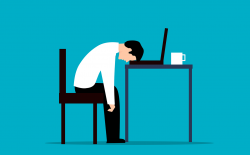

According to research by Trades Union Congress (TUC), people are facing more intense working days than ever, with less time for private lives, and an increased risk of burnout.
55% of workers reported that work had become more intense and demanding, according to polling for the union body.
The TUC's work intensification study said the shift was in part due to technology, as well as a decline in workers' autonomy over how they spend their time.
Three out of five working people (61%) said they felt exhausted at the end of the working day, polling of more than 2,000 working people in England and Wales found.
Workers also reported that the situation was getting worse. More than a third of those polled said they were spending more time outside contracted hours reading, sending and answering emails than they did a year earlier.
The TUC paper said several common factors have combined to create a "perfect storm" for work intensity, including:
A decline in collective bargaining and a lack of enforcement of working time regulations were also highlighted as factors by the organisation, which represents more than 5.5 million working people in 48 unions.
TUC General Secretary, Paul Nowak, said: "No one should be pushed to the brink because of their job. Gruelling hours, pace and expectations at work are growing problems up and down the country. This is a recipe for burnt out Britain".
"Chronic staff shortages, intrusive surveillance tech and poor enforcement of workers’ rights have all combined to create a perfect storm. It’s little wonder that so many feel exhausted at the end of their working day".
The Health and Safety Executive (HSE), which is responsible for enforcing maximum weekly working time limits and assessments for night work, has had its budget cut in half, in a decade.
Dr Ananta Dave, the Royal College of Psychiatrists' Lead for Wellbeing and Retention, said: "Burnout is not considered a mental illness but can seriously impact mental health and lead to more prolonged mental health problems when not treated appropriately".
"People who are concerned about burnout should be able to seek help at work from their staff health and wellbeing service, line manager or occupational health team. Alternatively, they can talk to their GP about the support that is available".
"Employers have a statutory duty of care to their employees and need to do all they can to promote good mental health in the workplace and support those employees who become unwell".
Women were more likely than men to say they felt exhausted at the end of most working days (67% to 56%), and that work was getting more intense (58% to 53%), according to polling for the TUC by Thinks Insight.
Overall, one in three working people said they were spending more time outside contracted hours doing core work activities, and 40% reported they were required to do more work in the same amount of time.
The TUC has argued that urgent action must be taken to prevent the nation becoming burned out.
Nowak said: "It’s time to tackle ever-increasing work intensity. That means strengthening enforcement so that workers can effectively exercise their rights".
"It means introducing a right to disconnect to let workers properly switch off outside of working hours".
"And it means making sure workers and unions are properly consulted on the use of AI and surveillance tech, and ensuring they are protected from punishing ways of working".
For more information on this subject, see: